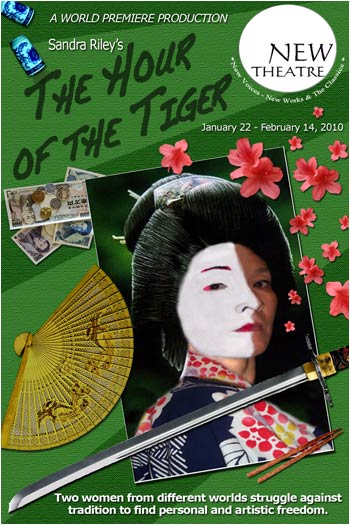The Hour of the Tiger, a new play by a Miami-based writer, gets its name from a
Japanese belief that 4 a.m., give or take an hour, is a time when anything can happen. At the start of this Japan-set play, 4 o'clock is the time of a meeting between a geisha and an American teacher, but soon enough, it becomes clear that for the four characters of this play, 1973 is tiger time.
The characters: Alexa, an American civilian who finds herself teaching drama at a military base after being ditched by her girlfriend of four years in Miami; Alexa's friend David, an American banker with influential friends in New York; Sanagi, the geisha who works almost as a slave for Hiroshi and yearns to be a modern dancer; and Hiroshi, Sanagi's manager, who fears her will is strong will because she is descended from samurai and who is taking English lessons, and getting stock picks, from David. It's David who argues, to Alexa, that times are changing, that mores are loosening up in America in 1973. There's some historical validity to the claim: the Supreme Court eased the definition of pornography that year, for example, and (in unrelated news) "The Joy of Sex" had been published the year before.
Playwright Sandra Riley herself taught at a Japanese military base in `73. She eventually turned to writing novels, histories of the Bahamas, and solo-actor plays based on Bahamian historical figures.
The Hour of the Tiger, in development two years at New Theater in Coral Gables, is, with the help of outstanding tech, at times engrossing, but Riley hasn't yet managed to sketch out all her characters the males in particular. David comes off as little more than a collection of convenient talents, Hiroshi largely as a money-hungry meanie - albeit one who plays the shamisen, a plucked, three-stringed instrument used in traditional Japanese music.
These characters exist in Japan's "floating world" of pleasure-seekers, artistic and sexual. So we have Alexa's take on Tennessee Williams, Sanagi's admiration of Martha Graham, Hiroshi's plucking musicianship and David's pleasure in sharing his appreciation of Japanese culture.
And we have the awkwardness and ambivalence of cross-cultural pairings Alexa and Sanagi, David and Hiroshi. Hiroshi he of the centuries old music, the legends of the samurai, the Wall Street portfolio seems particularly torn.
Meanwhile, kimono-clad Sanagi is hemmed in by culture, lack of money and wardrobe. Watching the play, I recalled reading that just about the only thing a woman can do in a kimono is stand or kneel, and that holds true in this attentive production under New Theater artistic director Ricky J. Martinez.
The exasperation of intimate cross-cultural communication is best displayed when Alexa (South Florida theater vet Kim Ehly) tosses the dictionary aside as she struggles to speak Japanese to Sanagi (Gwendolyn Lai, in her New Theater debut).
Between David (Christopher Vicchiollo) and Hiroshi (Eric Miji), though, there are distressingly long pauses between lines even if the characters are supposed to be struggling. My initial thought: inadvertent bad timing. But as the play wore on (the action takes place over several months) and the gaps recurred and my mind wandered the gaps were that long -- I decided to consider the pauses the aural equivalent of the empty spaces that are important in Japanese art. This helped a little.
There was no help, though, for a handful of scenes that simply didn't work: a bit of melodrama with a sword, Alexa railing against wars, David relating the death of his Vietnamese wife.
The set, lighting, music and costumes go far in making you mindful of Japan. Scenes play out before a low, curved-roof pagoda. On one side is David's place, on the other is Hiroshi's, complete with curved samurai sword; each man wears a casual, blue-gray yukata-style robe. Lights rise and fall gracefully as the setting changes between these main areas and occasionally other settings a subtle spotlight alone denotes the nightclub where Alexa and Sanagi meet. Lovely kimonos.
A crisp soundtrack that includes classical Japanese music and pop music from the American Top 40 of the 1970s.
Sandra Riley writes in a program note that her play "is about the power of love to support personal and artistic freedom." She may have the foundation of a better play here with The Hour of the Tiger, but this version doesn't cohere. At an intermissionless 80-minute running time, though, there's probably room to grow her characters. 
